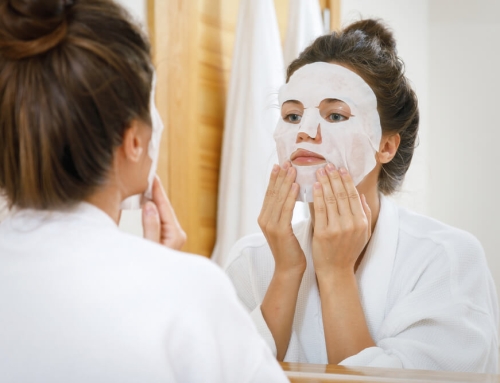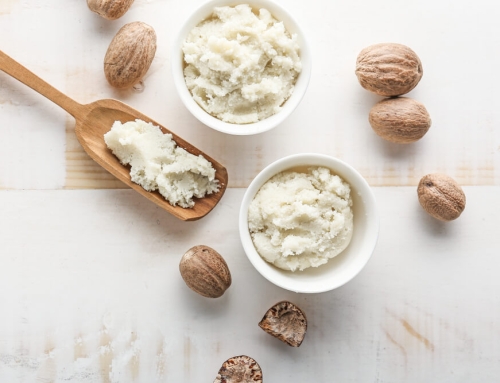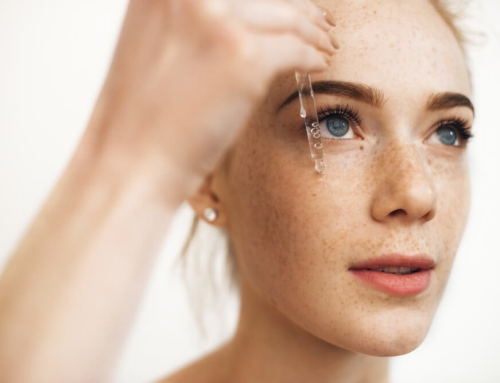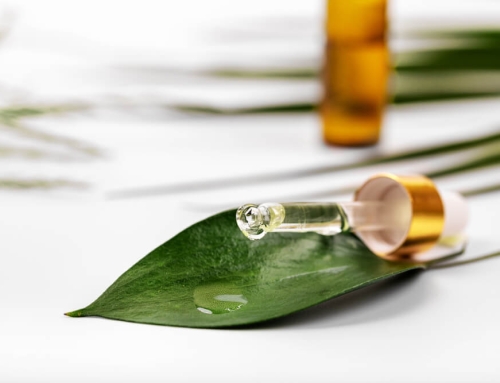Does the skin on your body often end up feeling dry and rough over the winter months?
This is common – it’s all down to the way in which the air in the winter lacks humidity, meaning that moisture in your skin evaporates out at a much faster rate.
When it comes to skin care, people often focus on their face, neglecting to pay the right attention to their body until their skin looks dull and parched.
Make this winter different by taking a more proactive approach. Here are 10 things you need to do to keep the skin on your body looking and feeling soft and smooth throughout the winter months.
Regularly Exfoliate
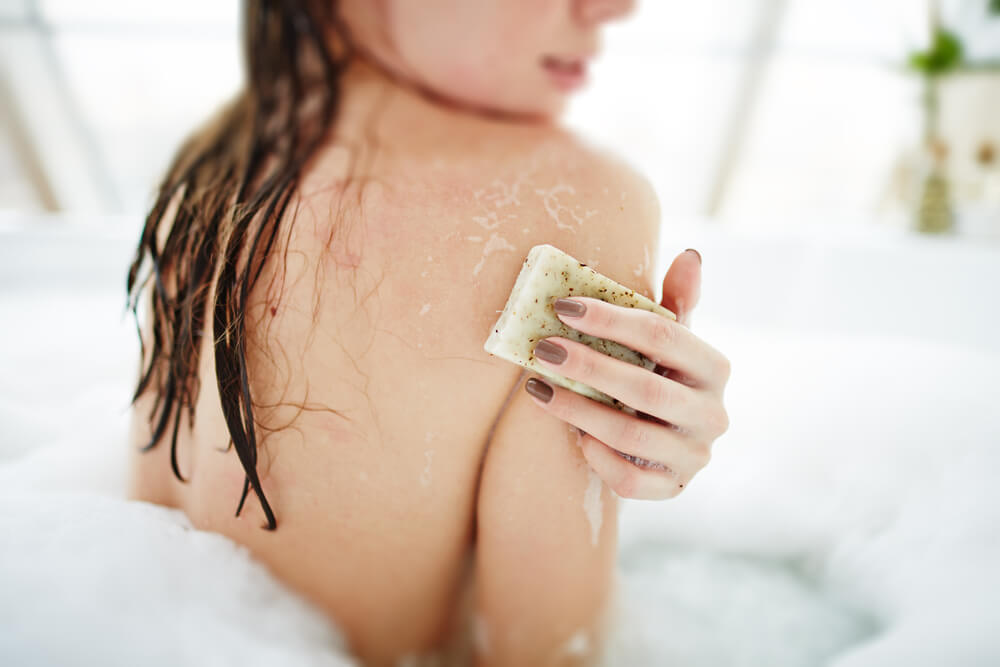
If you’re ever looking for an instant glow, exfoliation always helps.
This process not only sloughs away those rough and dull dead skin cells that sit on the surface of your skin, therefore revealing the fresh, new skin cells beneath, but it also stimulates the cell turnover process.
How Often Should You Be Exfoliating Your Body in the Winter?
How often you need to exfoliate will vary depending on your skin type, as well as the exfoliant that you are using.
However, generally, twice a week is usually advised in the winter months.
Body scrubs are usually the most convenient and cost-effective way to exfoliate the body, but try not to use an exfoliant that’s too harsh. Your skin will already be more sensitive in the winter, and you don’t want to end up over-exfoliating, as this will leave your skin drier than ever.
Look for a body scrub that contains plenty of hydrating and soothing ingredients, such as the 24K Classic Body Scrub. In addition to numerous plant extracts and oils, this formula also features multiple humectants to boost skin moisture, as well as vitamin E.
Butter Up
As mentioned, the skin loses moisture at a much faster rate during the dry days of winter.
One way to prevent this is by using a rich and thick moisturizer. The ingredients within your moisturizer will not only increase your skin’s moisture content, but will also form a protective barrier over the surface of your skin, preventing any moisture from evaporating.
Look for products that contain natural plant butters and oils, as well as plenty of humectants and antioxidants.
The 24K Classic Body Butter is always a hit, simply due to its exemplary ingredient list, which features the likes of:
- Shea butter
- Aloe vera leaf juice
- Sunflower seed oil
- Glycerin
- Cucumber extract
- Chamomile extract
- Calendula extract
How Often Should You Be Moisturizing Your Body in the Winter?
If your skin feels dry, then moisturize. Even if you only think that your skin may possibly be feeling dry, but aren’t quite sure, you should still moisturize, because chances are, it could do with a top-up.
There’s no such thing as too much when it comes to moisturizing in the winter – it will all depend on your skin type. Those with dry skin may need to moisturize several times a day, while those with oily skin may get away with once or twice a day.
Either way, here’s a trick to boost your skin’s moisture levels even more…
Try applying your moisturizer while your skin is slightly damp, rather than dry.
Why?
Well, as mentioned, a moisturizer helps to lock existing moisture into your skin. If your skin already contains additional water particles, these will be sent even deeper into your skin cells by a body butter, rather than evaporating into the air.
Of course, if you need to moisturize several times a day, you can’t take a shower each time. Instead, give your body a quick spritz with the 24K Hydrating Body Mist, before topping this with your body butter.
Turn Down the Temperature
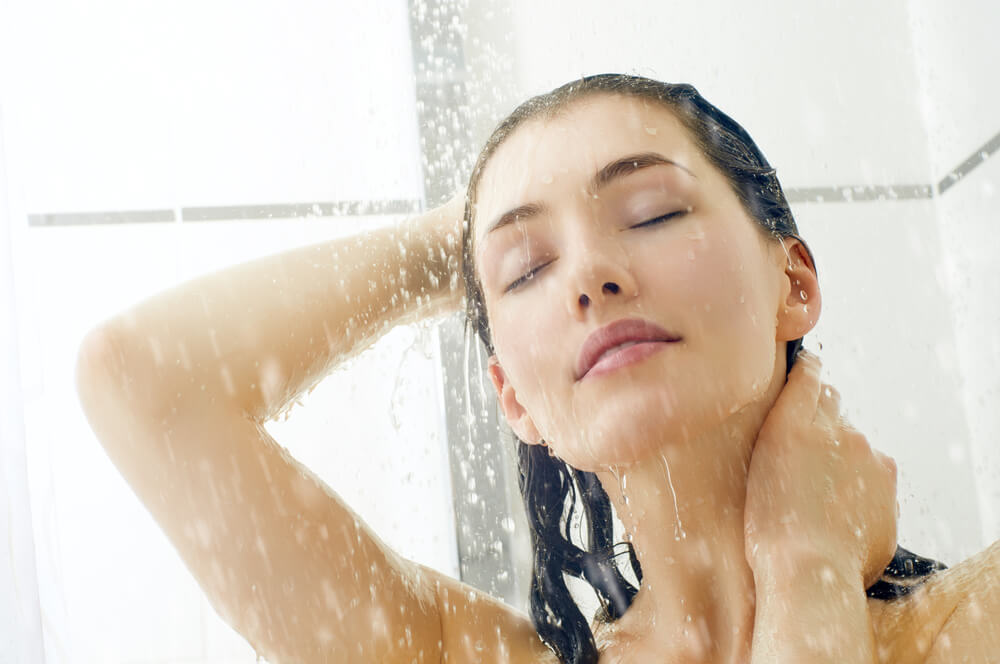
Speaking of showers…
How hot do you have your shower water during the winter months?
Chances are, you enjoy languishing in that satisfying warmth, going for hotter and longer showers in the winter than you do in the summer.
However, this is the opposite of what you should be doing if you really want the skin on your body to glow…
On the outermost layer of your skin sits a protective barrier, whose role it is to prevent moisture from evaporating while also blocking irritants from entering into the skin.
That barrier already often weakens during the winter months, and hot water really doesn’t help. Hot water strips away this precious barrier, leaving your skin even more vulnerable to dryness and damage.
How Hot Should Your Showers Be in the Winter?
Aim for lukewarm. Basically, go as cool as you can handle if you really want to do what’s best for your skin.
Try to keep your showers short too – five to seven minutes is ideal.
Use an Oil on Dry Patches
No matter how hard you try, you will probably still end up with some dry patches on your body over the winter, especially if your skin was already dry to begin with.
This is especially common around the elbows and the knees.
Why?
Because the skin in those areas contains fewer sebaceous glands. These glands are what produce and release sebum, the natural oil that keeps your skin moisturized and hydrated.
Without much sebum, those areas are prone to dryness, which is why they deserve some extra attention.
Often, a moisturizer or body butter on its own just simply isn’t enough to target this excessive dryness.
So, what should you use instead?
Try a nourishing oil that’s filled with natural plant oils. The 24K Aromatherapy Body Oil is a great example, since it’s packed with a rich blend of botanical oils, including:
- Sunflower
- Rosemary
- Soybean
- Pomelo grapefruit
- Jojoba
- Olive
- Chia
- Sesame
…and the list goes on!
Apply a moisturizer onto your dry patches first and then follow this up with an oil. It won’t be long before you notice the skin in those dry areas taking on a much softer and smoother appearance.
There’s also nothing stopping you from treating the rest of your body to a nourishing body oil for an all-over glow.
Humidify Your Home
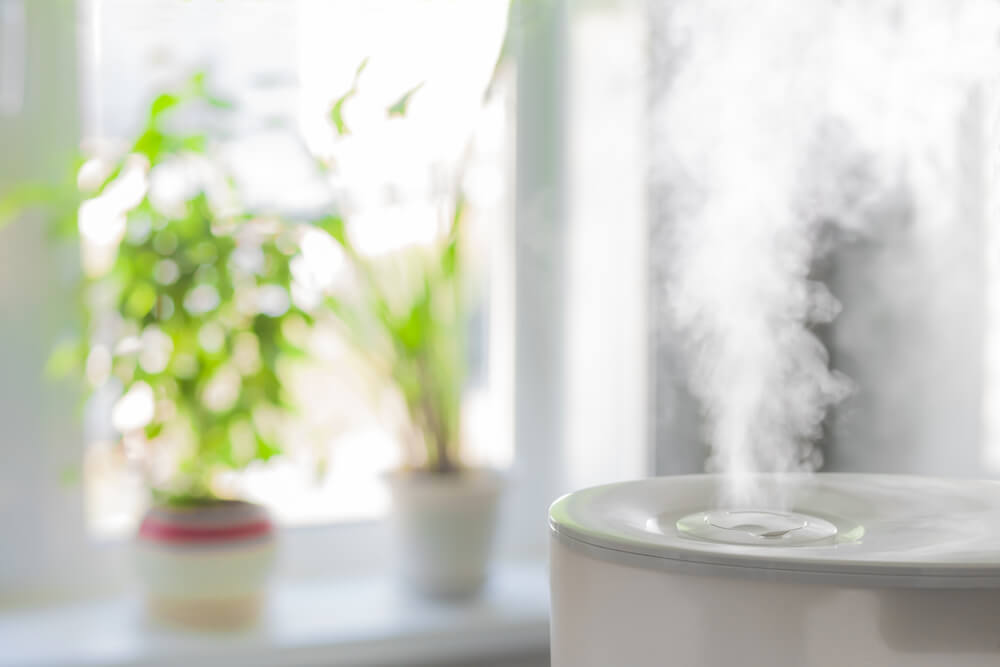
Remember how it was mentioned that the dry air in the winter causes the skin’s moisture to evaporate at a faster rate?
Well, one way to counter this is by increasing the amount of moisture in your air, which will slow down trans epidermal water loss.
A humidifier is the best way to do this. In addition to helping to keep your skin more hydrated, a humidifier will also:
- Help to treat sinus headaches, irritated eyes, dry throats, allergies, coughs, and chapped lips
- Reduce your risk of catching the flu
- Keep your hair moist and glossy
- Perk up wilting house plants and keep any wood furnishings in your home looking good for longer
Where’s the Best Place in Your Home for a Humidifier in the Winter?
Usually, that answer would be the bedroom, since this is where people usually spend the longest stretch of time in a day.
However, with working from home becoming so much more prevalent, you may find it more beneficial to place your humidifier in your home office, or wherever you find yourself spending the most time.
If your humidifier is easily portable, then move it around your house with you throughout the day to really help your skin.
Use Specialized Skin Treatments for the Body
It’s likely that you’ll be spending more time indoors than usual this winter, so why not put that time to good use by treating yourself to a specialized topical treatment?
One issue that many often face with the skin on their body is a lack of elasticity and firmness, which leads to the body looking less toned and much older.
While exercise is always the best way to really tone your body up, exercise alone won’t transform your skin. Instead, you’ll need the help of ingredients that are able to really trigger changes in the deeper layers of your skin.
Take the 24K DMAE Bodylift Cream, for example. Its potent blend of DMAE, caffeine, vitamins, and botanical extracts will help to give you a silhouette that looks tighter and more toned, leaving you feeling so much happier and confident too!
Stay Hydrated Internally

If your body is feeling dehydrated, then this is going to quickly show on your skin.
How?
You’ll notice an overall dullness and roughness, with a tired and lackluster appearance.
Since it doesn’t feel hot in the winter, you may find yourself drinking less fluids.
Make an effort to drink at least eight glasses of fluids a day. Water is great, but herbal teas can actually be even more beneficial. Pick those that provide additional skin-boosting benefits, such as:
- Chamomile
- Peppermint
- Black
- Green
- Oolong
Infused waters are great too, as the antioxidants within the fruits you infuse will leach out into the water. This not only has skin benefits, but overall health benefits too.
Try infusing your water with one or a mixture of the following fruits:
- Lemon
- Orange
- Papaya
- Cucumber
- Apricot
- Mango
- Pineapple
Even better, mix and match some of the listed fruits with some of the different types of teas, such as a mango chamomile or lemon and peppermint.
Eat the Right Foods
The food that you eat will have a direct impact on how your skin looks, not only on your face but also on your body.
If you know that your diet has been lacking lately, now is the time to change it, before winter truly hits.
While a healthy and balanced diet is what you need, there are certain foods out there that are known for being especially beneficial to the skin, such as:
- Yellow and orange fruits and vegetables, such as carrots, apricots, and sweet potatoes
- Spinach and other leafy greens
- Tomatoes
- Berries
- Oily fish, such as mackerel and salmon
- Nuts
- Beans and lentils
If you’re willing to mix up your cooking styles a bit, give Mediterranean cooking a try. The Mediterranean diet is said to be one of the healthiest in the world. From seafood paella to vegetable tagine, there’s no denying that it also happens to be one of the tastiest!
Of course, it goes without saying that in addition to eating the right foods, you should also be avoiding the wrong ones.
Processed foods, sugar-filled snacks, meals that are high in saturated fats…there’s so much out there that can really play havoc on your skin. The holidays are known for being a time of food indulgence, and while everyone deserves to treat themselves over the festive season, keep your skin in mind too.
Cover Up Outdoors
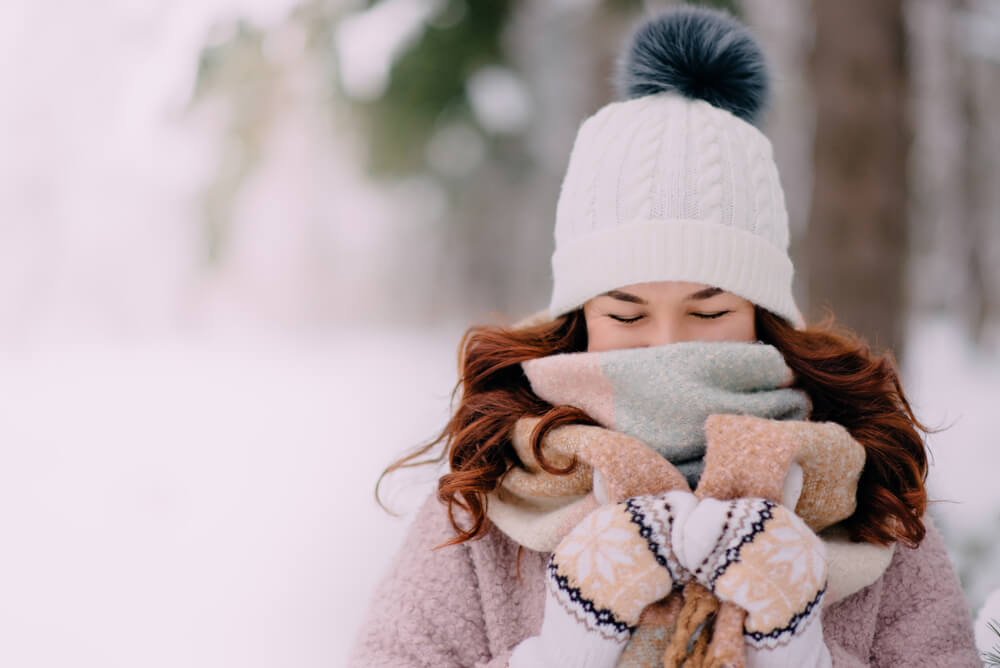
Exposing the skin on your body to the cold isn’t going to do it any favors.
Chances are, you will naturally want to stay covered up in the cold, and it’s really important for your skin that you do.
The bitterly cold air, along with any harsh winds, will damage that protective skin barrier that was mentioned earlier. This leaves your skin susceptible to so much damage.
Gloves, scarves, hats, and multiple layers will all be your skin’s best friend this winter.
Avoid Irritants
Your skin is naturally more sensitive in the winter, meaning that it may no longer be able to tolerate the same things it did in the summer.
If you have noticed flare-ups in chronic skin conditions, such as eczema or psoriasis, then it could be down to a skin irritant such as:
- Laundry detergents
- Particular fabrics, such as wool
- Specific ingredients in cosmetic products
Identifying your triggers is the best way to deal with this issue, as you will then know exactly what you need to cut out from your life.
The winter months can be difficult for your skin, and it doesn’t take long for the body to take on a dull and rough appearance. Take these ten steps now to prevent this from happening, so that you can enjoy a softer and smoother body throughout the colder season.




